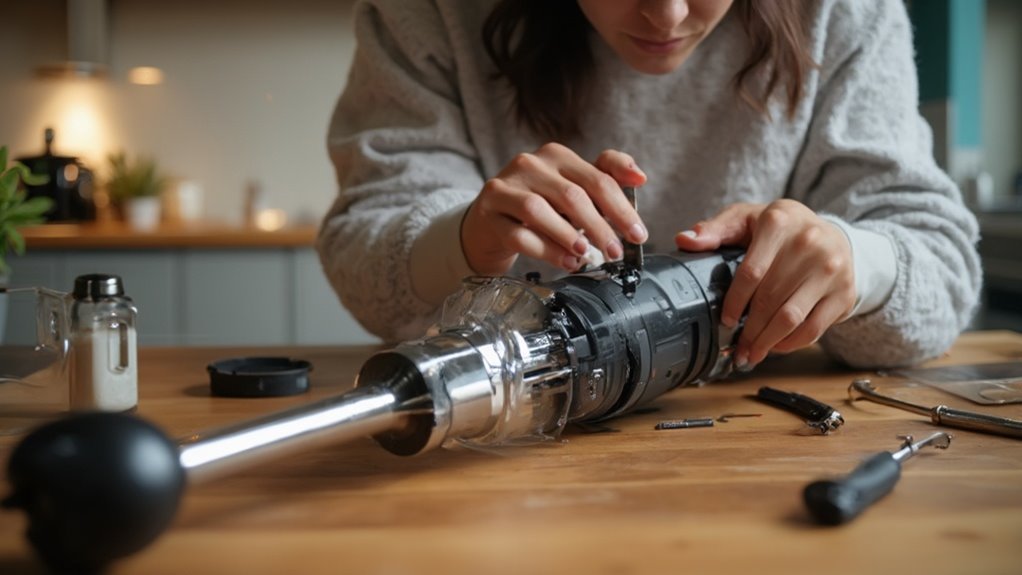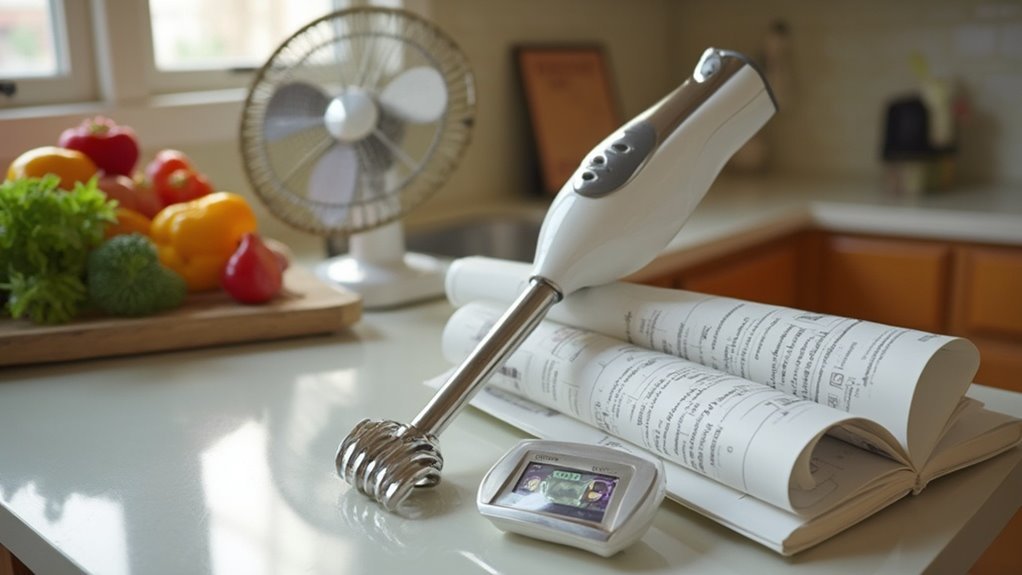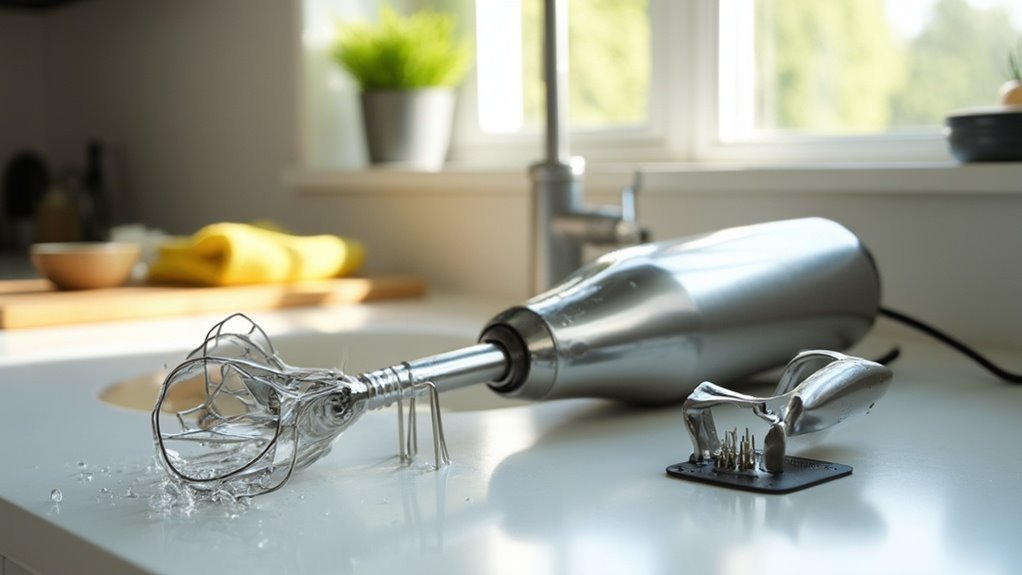To troubleshoot your Cuisinart immersion blender, first, verify it's securely plugged into a working outlet. Check for loose or damaged cords and plugs. If the motor won't start, inspect the power switch for debris. For blade issues, confirm the assembly is correctly attached and aligned. If overheating, limit blender usage to short bursts and clear ventilation slots. Additionally, inspect for unusual noises or attachment problems. Explore further for more detailed solutions.
Key Takeaways
- Ensure the immersion blender is securely plugged into a functional outlet and check the cord for any visible damage.
- Confirm the blade assembly is correctly attached and aligned with the motor base for proper operation.
- Inspect for foreign objects or loose components causing unusual noises during operation.
- Limit operation to short bursts and ensure ventilation slots are clear to prevent overheating.
- Regularly check the power cord for fraying or exposed wires and store it loosely to maintain integrity.
Motor Fails to Start

When your Cuisinart immersion blender's motor fails to start, it's essential to systematically address potential issues to identify the root cause.
Start by ensuring that the appliance is securely plugged into a functioning outlet, as electrical issues often stem from power source problems. Check the cord and plug for damage, which might interrupt the electrical flow.
Ensure the appliance is plugged into a working outlet and inspect the cord for any damage.
Next, focus on motor troubleshooting by inspecting the blender's power switch; sometimes, debris or moisture can interfere with its operation.
If the switch appears clean but the motor still doesn't start, consider resetting the device if it has a reset button. Ensuring freedom from technical glitches empowers you to continue blending effortlessly.
Should these steps not resolve the issue, professional repair might be necessary to restore functionality.
Blades Not Spinning
Encountering an issue where the blades of your Cuisinart immersion blender don't spin can be frustrating, yet systematic troubleshooting can help resolve it.
Start by ensuring the blade assembly is securely attached. A loose connection might prevent rotation, so firmly twist the blade assembly onto the motor base.
If it's still not spinning, inspect the motor alignment. Misalignment can impede the motor's ability to engage the blades effectively. Reattach the motor, ensuring it's properly aligned with the blade assembly.
Test the blender by running it briefly. If the issue persists, examine the power source and the blender's settings. Sometimes, a tripped circuit or incorrect speed setting can affect performance.
Unusual Noises During Operation
After ensuring the blades of your Cuisinart immersion blender spin properly, you might notice unusual noises during operation.
These blender sounds can be unsettling but are often straightforward to address with the right troubleshooting techniques. Here's what to take into account:
- Foreign objects: Check for any debris lodged in the blade area, as this often causes abnormal noise.
- Loose components: Inspect the attachment points; loose parts can produce rattling sounds, indicating a need for tightening.
- Motor issues: Listen for grinding or whining as these may suggest motor wear, requiring professional service.
Addressing these issues will help restore smooth operation and maintain your blender's performance.
Overheating Issues

If you find your Cuisinart immersion blender overheating, it's crucial to address this promptly to prevent damage.
Overheating causes often include extended use without breaks, blending thick mixtures, or blocked ventilation. To prevent overheating, limit continuous operation to short bursts and let the motor cool between uses.
Also, avoid blending overly dense ingredients without adding some liquid. Check that the ventilation slots are clear of obstructions like food particles or dust. Regularly cleaning these slots can enhance airflow, maintaining performance.
If your blender continues to overheat despite these measures, inspect for internal blockages or faults.
Trouble With Power Cord
When your Cuisinart immersion blender experiences issues with the power cord, it's important to act swiftly to guarantee safety and functionality.
Begin by unplugging the blender to avoid potential electrical hazards. Inspect the cord for visible damage, such as fraying or exposed wires, which may require power cord repair. Proper cord management can prevent these issues from occurring in the future. Keep your workspace organized and make sure the cord doesn't tangle or twist during use.
Unplug your blender to inspect for cord damage and ensure safety in your workspace.
Consider these steps for efficient power cord maintenance:
- Inspect regularly: Check for wear and tear to address issues early.
- Avoid sharp bends: Prevent cord damage by keeping it straight.
- Store properly: Wrap the cord loosely for storage to maintain integrity.
This proactive approach guarantees your blender operates smoothly.
Attachments Not Fitting Properly
Moving from power cord concerns, let's address another common issue: attachments that don't fit properly on your Cuisinart immersion blender.
It's essential to verify attachment compatibility to avoid unnecessary frustration. Start by checking the model number on your blender and confirming it matches the attachment specifications.
If you've got the correct attachments but they're still not fitting, inspect the connecting grooves and latches for any obstructions or damage. Sometimes, minor fitting adjustments are needed.
Align the attachment precisely, applying gentle pressure until it clicks securely into place. If resistance persists, double-check for any misalignment or debris that could be interfering.
Difficulty With Cleaning and Maintenance

When cleaning your Cuisinart immersion blender, guarantee you detach the blade safely by following the manufacturer's instructions to prevent injury.
Store the blender properly by keeping all components dry and in a clean, accessible location.
To remove stubborn residue, use a mild detergent and a soft brush to avoid damaging the blender's surface.
Detaching Blade Safely
Detaching the blade from your Cuisinart immersion blender is essential for thorough cleaning and maintenance.
Ensuring blade safety while using proper detaching techniques will keep your blender in prime condition. Here's how to do it without a hitch:
- Unplug the blender: Always disconnect from the power source to prevent accidents.
- Twist and release: Hold the motor body with one hand, and twist the blade assembly counterclockwise to detach it.
- Handle with care: Carefully remove the blade to avoid injuries, as it's sharp.
These steps allow you to clean the blade and the blender's shaft separately, ensuring peak performance.
Proper Storage Techniques
After safely detaching the blade from your Cuisinart immersion blender, proper storage becomes essential to maintaining its longevity and performance.
First, verify the blender and its parts are completely dry after proper cleaning. Moisture can cause rust, compromising the appliance's efficiency.
Place each component in an organized fashion, using designated storage compartments if available. An ideal placement involves keeping the blender's motor unit in a cool, dry area, shielded from direct sunlight.
Secure the blade in a safe spot to prevent accidental injuries. Avoid cramped spaces where parts may become tangled or damaged.
Removing Stubborn Residue
Persistent residue on your Cuisinart immersion blender can pose a cleaning challenge, but with the right approach, you can tackle it effectively. Stubborn residue often clings to the blades and shaft, making effective cleaning essential for peak performance.
Start by disassembling the blender according to the manufacturer's guidelines. Soak the detachable parts in warm, soapy water for about 15 minutes to loosen any hardened particles. Use a soft brush for scrubbing, ensuring you reach the crevices without causing damage.
- White Vinegar Solution: Mix equal parts water and vinegar, letting the parts soak to break down stubborn residue.
- Baking Soda Paste: Apply a paste of baking soda and water to stubborn spots, then rinse thoroughly.
- Avoid Harsh Chemicals: They can damage the blender's components.
Conclusion
Now that you know how to troubleshoot your Cuisinart immersion blender, you're ready to tackle any issue that comes your way. Isn't it satisfying to solve a problem yourself? By addressing motor failures, blades not spinning, unusual noises, overheating, power cord troubles, attachment issues, and cleaning difficulties, you've equipped yourself with the knowledge to keep your blender running smoothly. Remember, regular maintenance and attentive use are key to prolonging your blender's life. Happy blending!
